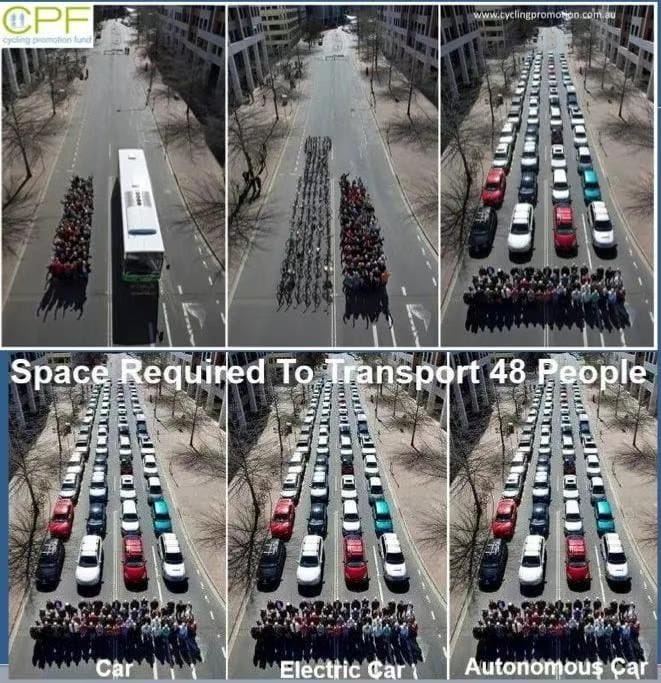It's good to be back. Really.
Welcome to "nouveau monde", a four-handed newsletter to better understand how to make the world better through the lens of retail. This is #62. Of course, we don't quit ;-)
Thanks for reading Nouveau Monde! Subscribe for free to receive new posts and support our work.
Le menu du jour at nouveau monde is about mobile and bags.
Today's newsletter is 848 words, a 4-minutes read. With a few links. Content, content, content.
Read, like, share, subscribe, comment :-)
Mobility Revolution
by Anthony
If you know me a bit, you know that I try to use my bike as much as possible, especially for my professional use. Because, as I live in the suburbs of Lille, it’s still hard to gat rid of a car when you’re moving with your family.
We’ve already talked about the future of mobility here, but I’d like to share new insights from Mc Kinsey and other stuff.
Let’s begin with McKinsey that just shared a new report about mobility as of today with a trend to 2035.
What’s interesting is that it has a broad - worldwide - view and also focuses on different cities in the world, as we know that mobility trends really are different in different countries and if you zoom in, different from a city and another in the same country.
I’ll let you dive into McKinsey’s thoughts about mobility in Shanghai, Munich or Los Angeles in the report but 2 main insights :
First, just a data that illustrates how the car is ubiquitous in the US : every single car in the US has 8 (height) parking space available. (have a look here if you want to know more).
Also, the report shows that private-owned car is the vast majority of mobility worldwide :
It will shrink in the next 12 years, with a small rise of public transport (+3%), ride-hailing (+2%), microbility (+3%) and they forecast a +7% in new forms of mobility, such as robotaxis. Which makes me wonder if they are not biased with a techno centric approach ?? It’s been years since Elon promised large scale autonomous vehicles and we haven’t seen much - yet.
And as a kind reminder :
Which leads me to a second topic : we need to get rid of the car as the Muti-tool solution and think more about how we need to move and which solutions exist (and which we should invent). In the Economist, we learn that some farmers in the Midwest started to think differently. In their surrounding, everybody had big trucks to ride but, one after another, some of them realized they could use mini vans imported from Japan (Key trucks) to make most of their operations. Yes, they won’t have the same look as if they had a big Ford F-150, but who cares ?
Transportation is about 1/4 of our CO2 emissions, I really do believe that this kind of shift might be contagious and that people will soon learn to behave more responsibly.
And move differently, by train or by bike for the holidays, for instance.
Shopping bags in Retail
by Phil
Three of the biggest retailers CVS Health, Target, Kroger and Dollar General are part of the companies participating in a reusable-bag pilot taking place in three states.
Global shopping bag market is estimated to be USD 11.9 billion in 2021 and is projected to reach USD 17.66 billion by 2028, at a CAGR of 5.8% during the forecast period (2022-2028). In the United States shopping bag market, approximately 100 billion plastic shopping bags are used each year. It takes about 12 million barrels of oil to make that many plastic bags (wtf). It would take the equivalent of nearly 50 million cars off the road for a year to offset the greenhouse gases emitted from making all those plastic bags. The majority of Americans (75% percent) say they would be likely to use reusable shopping bags if stores gave them a discount for doing so, and if the bags were more convenient to use. Although paper shopping bags require more energy and water to produce than plastic bags, they generate less pollution.
Also, while the majority of frequent grocery shoppers in the US (53%) still use single-use plastic bags, 39% (or 2 out of 5 market research respondents in an online survey) have already switched to reusable polypropylene or fabric bags.
There’s still some resistance to fabric grocery bag use among US grocery shoppers mainly due to convenience, but those who value the environment go out of their way to make using fabric grocery bags a priority.
Reusable packaging is both environment-friendly and cost-efficient. By reducing the repeated need to manufacture single-use packaging, companies can save the cost of raw material, energy, and labor. Since reusable packaging is designed for repeated use, it is stronger and more durable than single-use packaging.
The recent “Bring Your Own Bag” pilot will test the impact of collective action by retailers in driving broader cultural shifts, resulting in reusable bags becoming the norm wherever people shop. Seven national brands will participate: CVS Health, Target, Dick's Sporting Goods, Dollar General, The Kroger Co., TJX and Ulta Beauty.
Sources :
https://drugstorenews.com/major-retailers-taking-part-reusable-bag-pilots
https://www.macorr.com/blog/?p=142
Bonus track by Anthony
You can access the full nouveau monde playlist here on Spotify.
Thanks for reading Nouveau Monde! Subscribe for free to receive new posts and support our work.










